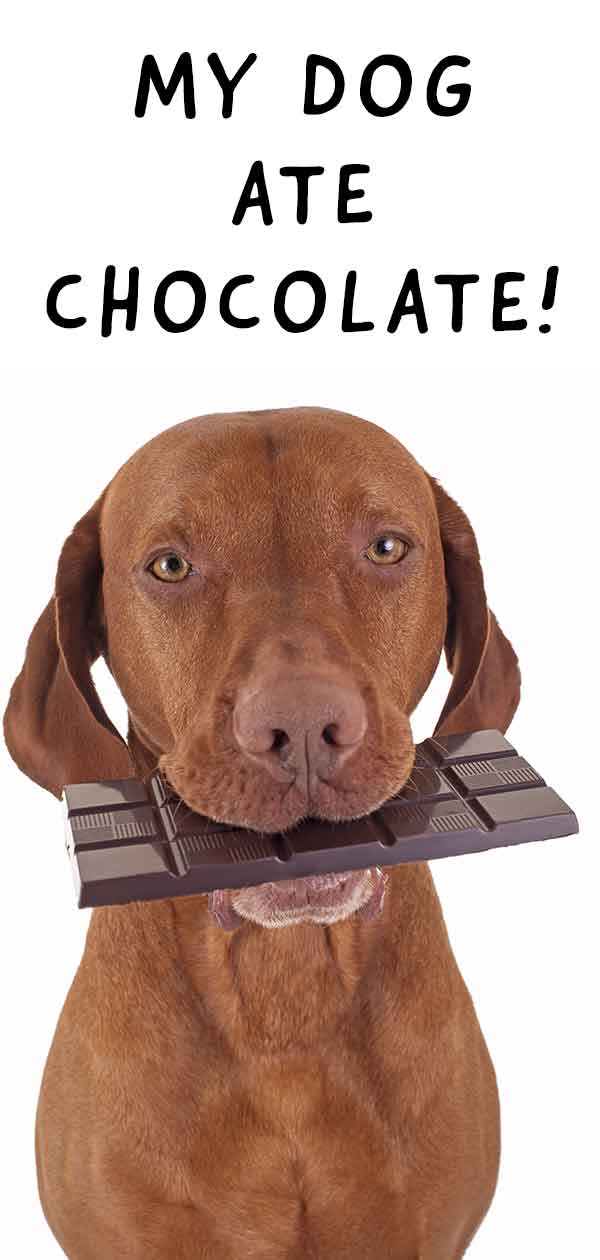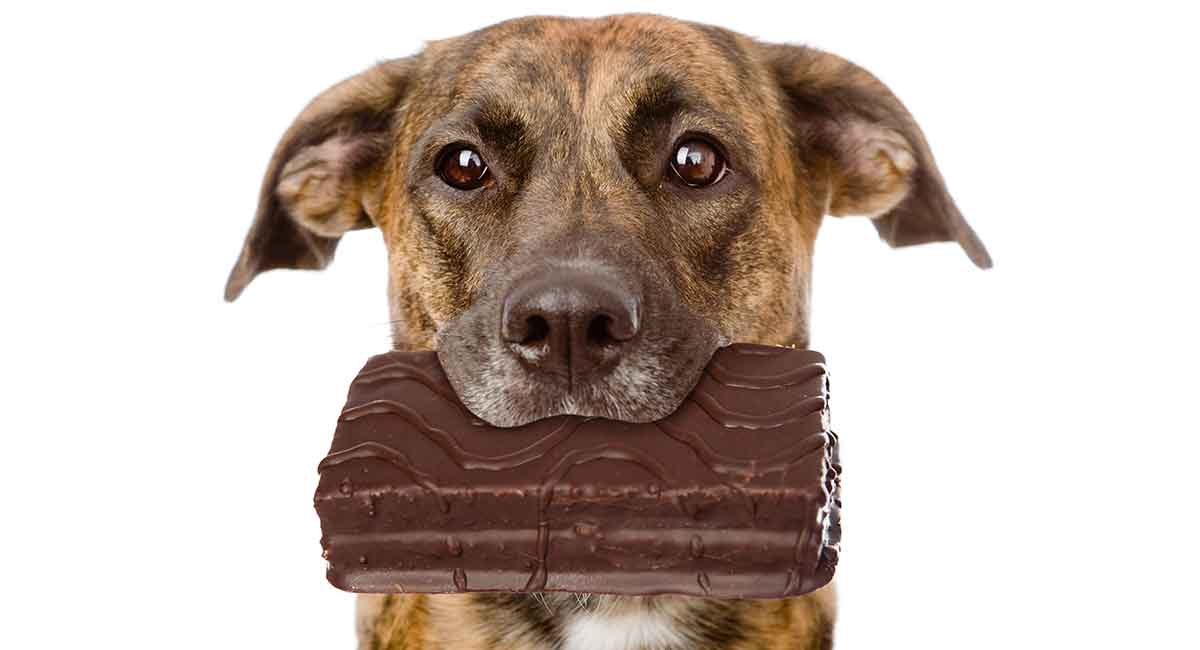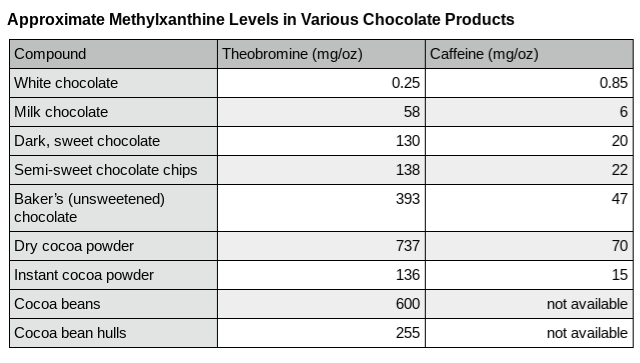
My dog ate chocolate – is she going to be OK?
Symptoms of chocolate poisoning in dogs include anxiety, heavy panting, and a fast heart rate.
The most dangerous ingredients for dogs in chocolate are theobromine and caffeine. These can both be fatal at high enough levels.
If your dog ate chocolate, call your vet straight away. Your dog may need immediate emergency care.
Read on for more information on chocolate and dogs, and what to do if your dog has eaten chocolate.
My Dog Ate Chocolate – Quick Links
Check the links below to see where you need to jump to.
- Dogs and chocolate
- Why is chocolate bad for dogs?
- What to do if your dog eats chocolate
- Symptoms of chocolate poisoning
- How long until symptoms appear?
- Can dogs die from eating chocolate?
- White chocolate and dogs
- Milk chocolate and dogs
- Dark chocolate and dogs
If your dog has eaten dark chocolate, or a lot of chocolate, go straight to the section on what to do if your dog eats chocolate.
Dogs and Chocolate
The average American human happily consumes about 11 pounds of chocolate each year. But for dogs, even a few ounces of chocolate can be enough to cause major illness.
Our dogs love eating chocolate almost as much as we do. They’ll dig it out of trash containers, pillage purses, and raid the pantry for a chance to taste the sweetness.

The ASPCA Animal Poison Control Center reported that chocolate was number four on their list of the top ten pet toxins of 2017, moving up a place from 2017.
So, why can’t dogs eat chocolate? The answer lies in a couple of the chemical compounds found in chocolate.
Why is Chocolate Bad for Dogs?
Methylxanthines are organic compounds found naturally in cocoa beans. These compounds have a stimulant effect on the central nervous system, cardiac and smooth muscle tissue.
That can be helpful when they’re used in drugs like the bronchodilator theophylline.
But too much methylxanthine can cause big problems for dogs. What happens if a dog eats chocolate?
The two methylxanthines thought to cause most of chocolate’s adverse effects in dogs are theobromine and caffeine.
Dogs and Theobromine
Dogs are much more sensitive to methylxanthines than humans. Plus, when dogs eat chocolate, they often eat large quantities.
Theobromine has a 17.5-hour half-life in dogs compared to the 7-hour half-life people.
Since dogs don’t metabolize theobromine as rapidly as humans, it can build up to toxic levels very quickly.
Studies have shown that some dogs can metabolize methylxanthines more quickly, accounting for the variable effects of chocolate consumption on individual dogs.
But, this doesn’t mean that dogs should ever eat chocolate. Or, that your dog can eat chocolate and be absolutely fine.
My Dog Ate Chocolate – What to do Next
Sometimes you will know that your dog has eaten chocolate, if you see them steal some. But, other times, you will only see suspect symptoms.
We will look at potential symptoms in full in a moment. But, they can include the following:
- Vomiting
- Anxiousness
- Panting
- Bluish Tongue
- Wobbliness when walking

Work Out How Much Your Dog Ate
See if you can find the packaging from the chocolate that your dog ate. Try to determine if your dog ate dark or milk chocolate.
The label will sometimes say something like 70% cacao, milk chocolate, semi-sweet chocolate, etc.
Also, determine how much your dog ate. Use this simple chocolate calculator to help determine the potential toxicity of the chocolate your dog ate.
Another option we give people calling into my vet clinic saying, “My dog ate chocolate!” is to call the ASPCA Animal Poison Control Center at (888) 426-4435. For a small fee, they will tell you if your dog is in trouble and walk you through what to do next.
Act Fast
If your dog is showing severe symptoms, take him to your veterinarian or an emergency veterinary clinic right away. The sooner he gets treatment, the better his chances of recovery.
If you find yourself exclaiming, “Oh no! My dog ate chocolate!” don’t panic. Gather your information and make some calls.
Most dogs come through the experience just fine if they receive proper treatment soon after eating chocolate.
In the future, make sure you keep anything containing chocolate safely out of reach of your dog. They love chocolate as much as you do and don’t understand that eating too much can make them very sick!
Symptoms of Chocolate Poisoning
In addition to vomiting, you may notice your dog seems restless, anxious, or hyperactive. Picture yourself after one too many double espressos.
Owners reporting, “My dog ate chocolate!” often notice mild to severe diarrhea and decreased appetite.
More severe symptoms of chocolate poisoning in dogs include changes in heart rate and the force of each heartbeat.
In the most extreme cases, a dog’s tongue can look bluish due to poor oxygenation of the blood.
Dogs may be wobbly on their feet after eating a toxic dose of chocolate.
Increased urination can also be a sign that a dog ate chocolate. Pancreatitis can occur in the days after a dog eats chocolate.
How Long Until Symptoms Appear?
The symptoms of chocolate poisoning in dogs are usually seen within the first three to twelve hours after consumption.
But, if you know your dog has eaten chocolate – especially dark chocolate – don’t wait for symptoms to show before you take action.
Most dogs vomit soon after eating chocolate, which is actually a good thing as it removes some of the undigested chocolate from the system.
But, don’t try to make your dog sick yourself. This can do more harm than good.
Can Dogs Die From Eating Chocolate?
Dogs can die from eating large amounts of chocolate. The LD50 of theobromine and caffeine (the dose at which half of the dogs died) is 100-200 mg/kg.
Dogs at increased risk of death include those with pre-existing heart disease or a propensity toward pancreatitis.
Dogs can die soon after eating chocolate from the primary effects or many days later if they develop a secondary disease like pancreatitis.
Small dogs are at greater risk since the toxic effects of chocolate are dose-dependent.
A Case Study
One case study to consider is about a small Shih Tzu named Bella that I examined after she ate chocolate. As I examined Bella, I noticed she seemed anxious and was panting a lot.
Anxiety is expected when pets come to the vet clinic, but I also noticed that Bella’s heart rate was a lot faster than normal at 250 beats per minute.
Bella was showing classic symptoms of chocolate poisoning in dogs.
Dogs and humans have been cohabiting for thousands of years. We share our homes, our beds, and our food.
Bella had found the gift of dark chocolate bonbons her owner had received for her birthday and chowed down on most of them.

Bella’s Size
This small Shih Tzu weighed only ten pounds (4.5 kg). Her owner figured that she had eaten about six ounces of dark chocolate.
Six ounces times 130 mg of theobromine per ounce of dark chocolate is a total of 780 mg of theobromine.
That comes out to a dose of about 173 mg/kg – definitely a toxic dose. No wonder she was showing symptoms of chocolate toxicity!
A large dog who eats a one-ounce milk chocolate bar may have mild to moderate symptoms but is unlikely to be severely affected or die from that dose.
Big dogs can handle more chocolate than little dogs, but it’s not a great idea for any size dog to eat any kind of chocolate.
White Chocolate and Dogs
Although no chocolate is great for dogs, we should take a look at the different types of chocolate your dog might eat. Not all types of chocolate will have the same effect on your dog.
It’s not the best idea for dogs to eat white chocolate because its high fat and sugar content may cause digestive upset.
However, as shown in the table below, white chocolate has the lowest levels of methylxanthines and is not expected to cause as severe symptoms as dark chocolate.

(Table adapted from Gwaltney-Brant, 2001.)
Milk Chocolate and Dogs
Milk chocolate has higher levels of theobromine and caffeine than white chocolate. But, it has lower levels than dark chocolate.
A good rule of thumb is that it takes about 0.5 ounces of milk chocolate per pound of body weight to cause moderate symptoms.
Milk chocolate also has lots of sugar and cream, like white chocolate. These ingredients can lead to tooth decay and obesity if enough is consumed.
But, it is likely that your dog would suffer from poisoning and toxicity before this happens.
Dark Chocolate and Dogs
Dark chocolate is the most dangerous type of chocolate for your dog to eat.
It only takes about 0.2 ounces per pound of dark chocolate to cause moderate symptoms.
At lower doses, you might see milder symptoms including restlessness, vomiting, and diarrhea.
So, keep all dark chocolate away from your dog. If you notice that your dog has eaten dark chocolate, call your vet straight away.
My Dog Ate Chocolate Summary
If you see your dog eat chocolate, or notice symptoms of chocolate poisoning in your dog, you need to act fast.
Theobromine and caffeine in chocolate are toxic and can kill your dog if he or she eats enough. This fatal dosage can be surprisingly low in small dogs. So, never risk giving your dog this food.
Make sure to keep all chocolatey snacks out of your dog’s reach. Especially during holidays like Easter and Christmas, when there is more chocolate in your home.
More Food Guides
If you’re looking for some human foods that are safer to share with dogs, read the following guides:
- Can dogs eat pasta?
- Can dogs eat okra?
- Are raspberries safe for dogs?
References and Resources
- Beasley, V. R. (et al), ‘A Systems Affected Approach to Veterinary Toxicology’, Veterinary Toxicology (2011)
- Collica, S. ‘The Polymorphism 1117C> T in the Cytochrome P450 CYP1A2 Affects the Metabolism of Theobromine in the Beagle Dog’, Veterinary Medicine Justus Liebig University (2012)
- Gwaltney-Brant, S. ‘Chocolate Intoxication’, Veterinary Medicine (2001)
- Noble, P. (et al), ‘Heightened Risk of Canine Chocolate Exposure at Christmas and Easter’, The Veterinary Record (2017)
- Cortinovis, C. & Caloni, F. ‘Household Food Items Toxic to Dogs and Cats’, Frontier Veterinary Science (2016)
- Craig, J. ‘Food Intolerance in Dogs and Cats’, Journal of Small Animal Practice (2018)

Justine Lourdes says
May I know what happened to Bella the shih tzu? Was she able to recover?
Mark says
My pit/boxer ate a 2 lb box of assorted chocolates, she ran around playing for a few hours and was fine. But now whenever I have candy she smells it and get all excited, I think she will always be addicted now.
Bryson Owens says
I really appreciate you talking about the common symptoms that are shown in dogs that ate too much chocolate. My daughter left some of her candy on the bed and left the room. The dog ate the candy so we need to take him to a vet to get his stomach pumped.